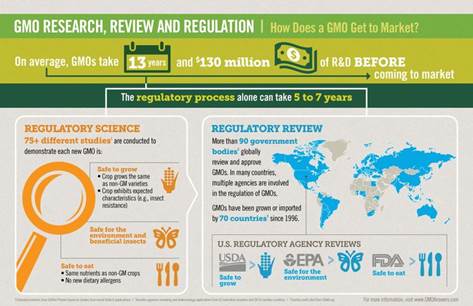Question
Answer
Expert response from Community Manager
Moderator for GMOAnswers.com
Friday, 22/05/2015 12:17
There are many elements to answering this question, covered by several experts who have already contributed to the site. Xiaohua Yang, PhD, postdoctoral research fellow in the department of horticulture at Cornell University, outlined a few of these in a recent answer:
“First, humans have been modifying our foods for more than ten thousand years. The domestication of agricultural crops was a process of selecting certain genetic compositions that were more beneficial for human consumption. Traditional breeding continues this process. Genetic engineering is also trying to achieve the same goal and often more directional and with better efficiency.
“Second, before GM crops can be released to the market, they are tested in ways in which conventional and organic crops are not. During the development of a new GM seed, safety testing is done largely by certified independent third-party laboratories using protocols required by the government. If a study were ever to yield a result that raised any food-safety concern, it is required by law that the information be presented to the FDA. GM crops are also tested for their safety as feed and in the environment and regulated by authorities, such as USDA and EPA.
“Third, GM crops are part of our life, and we are all benefiting from foods and medicines derived from transgenic plants. These include ‘virtually all beer (the brewing yeast), virtually all cheese (chymosin or rennin, the enzyme that causes milk to curdle), virtually all soy products, about a quarter of the medicines (such as insulin) we use, most maize, much squash and virtually all papayas produced’ (Raven, 2013). Not a single case of ill health has originated from the consumption of these products for the past 20 years, and, again, there is no reason we should expect that to happen.”
You may also be interested in reading an article on Transgenic Crops in Agriculture and Safety by Dr. Peter H. Raven, president emeritus at the Missouri Botanical Garden. In addition, scientific authorities around the world, such as the US National Academy of Sciences, United Nations Food and Agriculture Organization, World Health Organization, American Medical Association and American Association for the Advancement of Science, have analyzed thousands of scientific studies and concluded that GM food crops do not pose any more risks to people, animals or the environment than any other foods. You can read more here.
This image also illustrates the process of the research, review and regulation of GMOs:
